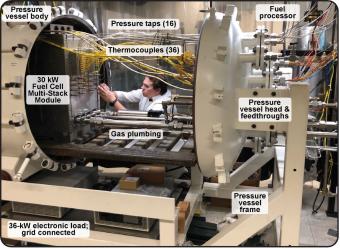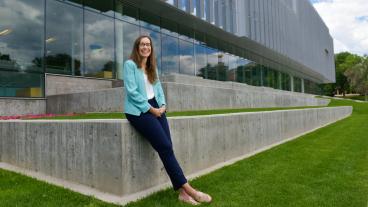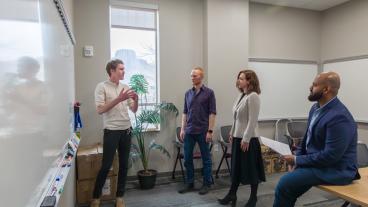Solid oxide fuel cell at Colorado Fuel Cell Center now helping to power Mines campus
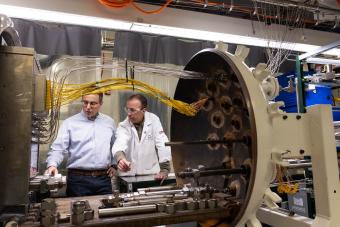
Rob Braun, University Distinguished Professor of Mechanical Engineering, and Neal Sullivan, professor of mechanical engineering, inspect the solid oxide fuel cell test bed at the Colorado Fuel Cell Center on the Mines campus. (Photo by Agata Bogucka/Colorado School of Mines)
Researchers at Colorado School of Mines are currently testing a novel pressurized solid oxide fuel cell power module that is capable of generating almost 30 kilowatts of electric power from natural gas and low-carbon fuels.
Housed within a new high-temperature pressurized test facility within the Colorado Fuel Cell Center, the first-of-its-kind prototype is now powering the Mines electrical grid as part of a U.S. Department of Energy program on low-carbon, distributed electricity generation. In recent testing, the unit achieved 26.2 kW of power, reaching 95 percent of its target power rating.
“This is a huge milestone for us,” said Rob Braun, University Distinguished Professor of Mechanical Engineering and principal investigator on the project. “We are now moving towards build and test of the other two power modules which will eventually be integrated into a full-scale, 100-kW demonstration test facility that targets unprecedented power generation efficiency. The target efficiency is at least six percentage points higher than any combined cycle power plant, but at one thousandth the scale.”
The research program is managed through DOE’s Advanced Research Projects Agency-Energy (ARPA-E), and features a hybrid fuel-cell and reciprocating engine system targeting 100 kW of net electricity at 70 percent efficiency under natural gas fuel and renewable fuels.
Researchers at Mines are currently characterizing the performance of one of three 30-kW solid-oxide fuel cell (SOFC) modules that will be integrated with an engine at Colorado State University’s Powerhouse Energy Campus.
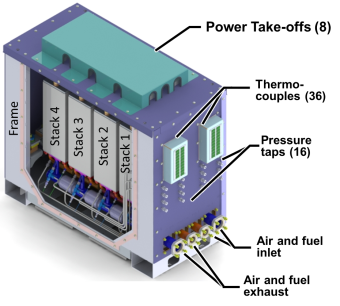
A single fuel-cell module contains four SOFC stacks that work together to achieve target power levels. The multi-stack module was designed by Mines researchers in collaboration with partners. The stacks are provided to Mines by research partner and solid-oxide fuel cell developer Ceres Power, Ltd. (Horsham, UK). The experimental team is led by Neal Sullivan, professor of mechanical engineering at Mines and director of the Colorado Fuel Cell Center.
“We are setting new CFCC power-generation records each time we operate this Multi-Stack Module -- today we reached over 26 kWe under simulated natural gas fuel and an operating pressure of three atmospheres," Sullivan said. "The generated electricity is being used to partially power the CFCC laboratory in which these experiments are being executed. We have collected extensive data on this Multi-Stack Module that provides critical performance verification before we integrate all three of them with each other and a reciprocating engine.”
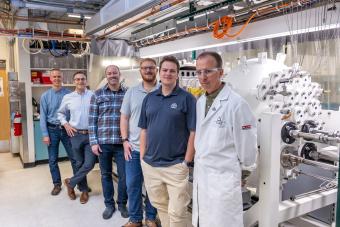
The research team also includes research staff Chris Cadigan and Chris Chmura, PhD students Cyrus Bousheri and Gus Floerchinger, and Tyrone Vincent, professor of electrical engineering. The CFCC test bed features pressurization to 10 atmospheres, extensive gas handling for synthesis of a wide range of fuel compositions, and 36-kW of electric-load capacity connected to Mines electrical grid.
Full-scale system testing is expected to occur next summer.
